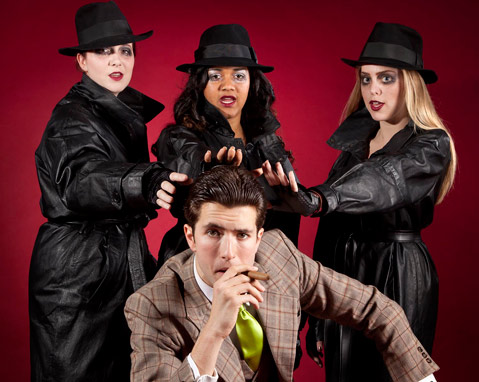UCSB Presents Biederman’s Match
A New Musical Based on a Play by Swiss Writer Max Frisch Gets Its World Premiere

Why do some works of art become classics? There’s craftsmanship, of course, along with brilliance of expression, and the underappreciated asset of adaptability. If a play expresses a timeless truth in such a way that each new generation can grasp it and apply it, it will likely live on.
Such is the case with Max Frisch’s cautionary comedy Biedermann and the Firebugs, also known as The Arsonists. Written in 1958, it is a parable for its time and for our own, a vividly entertaining warning that we are blind to things we don’t want to see.
This darkly amusing tale of danger and denial continues to inspire both audiences and artists. Friday night, a new musical adaptation titled Biederman’s Match will have its world premiere at UCSB.
“It’s very easy to ignore what you don’t want to deal with,” noted director Risa Brainin, who is creating the musical with playwright Beau Willimon, composer Michelle DiBucci, and lyricist Portia Kamons. It will be performed by a student cast accompanied by a five-piece band assembled by Jon Nathan.
The story centers on a businessman, Biederman, a self-satisfied success who does not hesitate to cut ethical corners to get ahead. He is concerned about news reports that arsonists have been burning down houses in his town, but he doesn’t feel personally threatened.
Feeling some residual guilt over a decision he made at the office, he agrees to let a homeless man spend the night in his residence. While initially ingratiating, this intruder begins to act more and more suspiciously, inviting a friend to join him and generally making himself at home. Before long, there are literally barrels full of gasoline sitting in the attic.
Biederman, who insists on seeing himself as a fundamentally decent man, chooses to look the other way even as other members of the household become alarmed. To him, all this is obviously a joke—and he can take a joke!
This incendiary story is told in a somewhat stylized fashion, as a chorus of firefighters narrates the events and offers asides to the audience. Driven by frustration, they ultimately enter the action to confront the central character, who still refuses to see what’s happening in front of his face.
The new musical adaptation of the work is the fourth world premiere Brainin has directed at UCSB, a continuing series that was recently christened the Launch Pad program. “We’re a research university,” she noted. “This is what we should be doing. We want to make UCSB a magnet for artists to come and do their work.”
The genesis of the musical can be traced back to the early 1980s, when Matthew Vaky directed a production of Frisch’s play at Carnegie Mellon University. DiBucci wrote some music for the staging; Kamons was in the chorus. Brainin, who was studying acting at the school, saw it from the audience.
All went on to successful careers in the theater: DiBucci is on the faculty of the Juilliard School, while Kamons is a London-based theater and film producer. When DiBucci, who wrote incidental music for several of Brainin’s professional productions, mentioned her interest in revisiting Frisch’s play, Brainin had a brainstorm: Why not mount a production at UCSB?
The trio approached playwright Willimon, author of the political drama Farragut North. He wrote a new adaptation that sets the play in the current-day U.S.A.—one that sticks closely to Frisch’s original script, according to Brainin, but also has a distinctly contemporary feel. Meanwhile, DiBucci returned to her score and “did a lot of rewriting,” Brainin said.
“With one minor exception toward the end of the play, only the chorus sings,” Kamons said. “They are powerful figures—feminine and knowing. Michelle’s music enhances this. It’s jazzy, seductive, playful, and a bit dark. It has a contemporary rhythm and bluesy sound. It makes use of modern sampling techniques, but also draws on gospel and torch songs.”
Frisch wrote the play as a metaphor for political events in mid-20th-century Europe (he was Swiss and lived in Zurich). Biedermann is seen by scholars to represent the German political class that thought it could control Hitler when he came to power in the 1930s—or, perhaps, the authority figures in Eastern Europe who assented without protest when the Communists took control after World War II.
A half-century later, this dark fable continues to resonate in interesting ways. Today, Biedermann could be viewed as the archetypal comfortable consumer, using ever more fossil-fuel energy as he ignores warnings about global warming.
Or perhaps he’s a complacent investor (circa 2006) who places his money in the hands of people he doesn’t know, who perform transactions he doesn’t understand. So long as the balance keeps growing, he doesn’t ask any questions—or consider the possibility that the entire system could blow up.
Willful naïveté never goes out of style. It just shows up in different ways.
“Mankind has done very little to distract us from Frisch’s thesis, so the play remains timely as ever,” Kamons commented. “To do nothing in the face of evil is to contribute to it. Complacency is complicity.”
4•1•1
Biederman’s Match will be at the UCSB Performing Arts Theatre beginning on Friday, February 11, at 8 p.m., and continuing Tuesday-Saturday, February 15-19, at 8 p.m. (matinees Sat. and Sun., Feb. 19-20, at 2pm). For tickets and information, contact the UCSB Department of Theater & Dance at 893-3022 or visit theaterdance.ucsb.edu.



